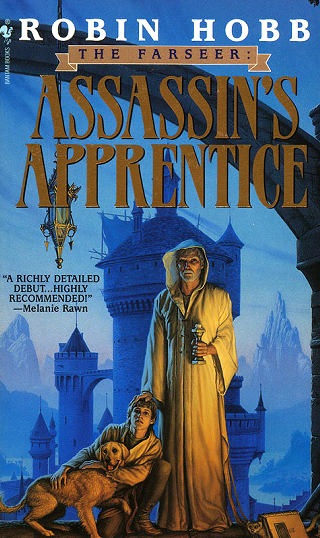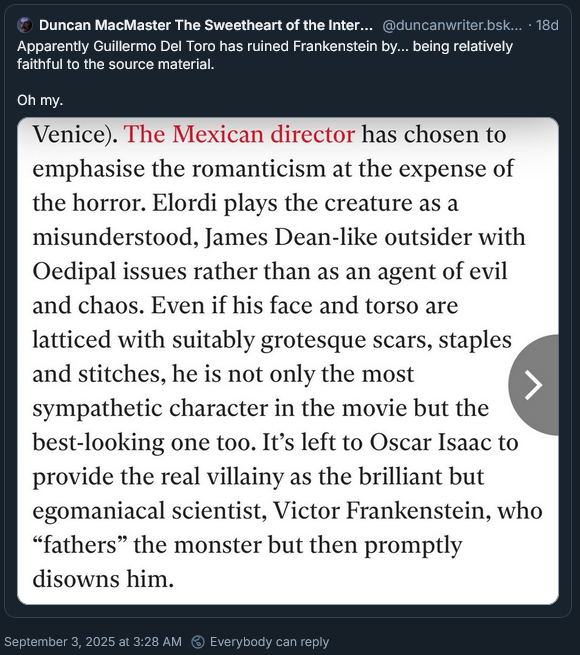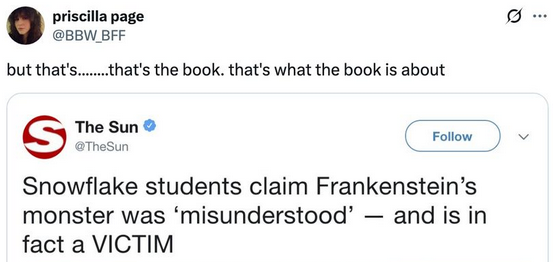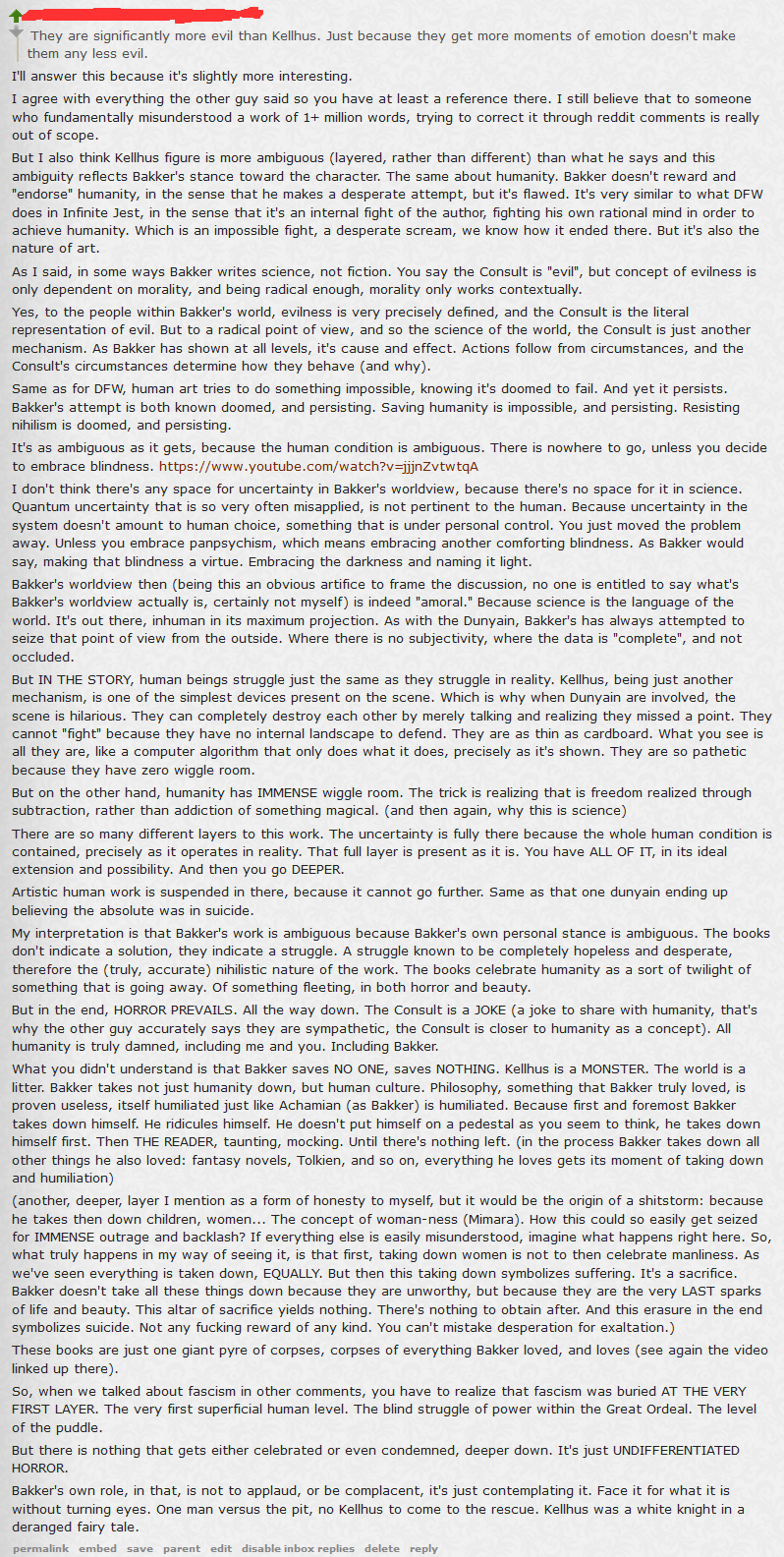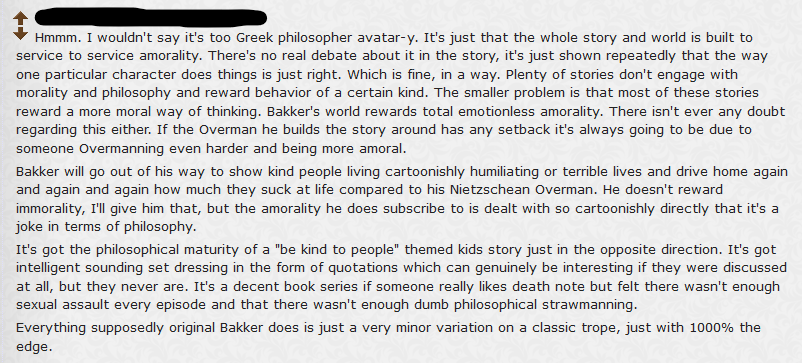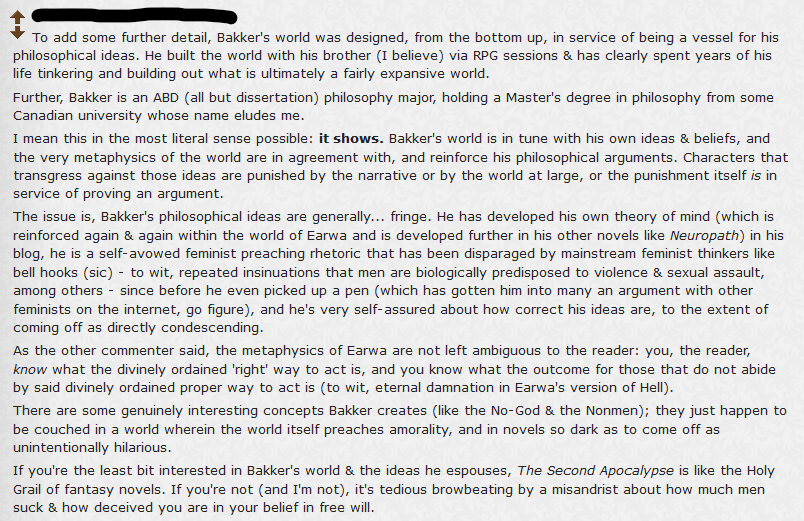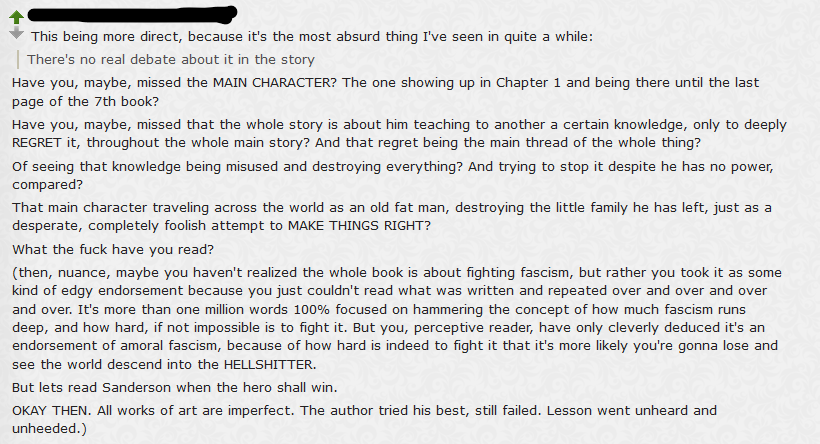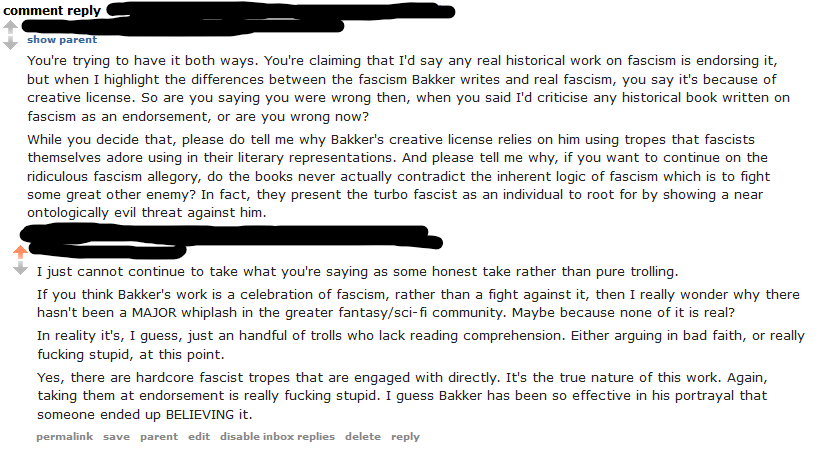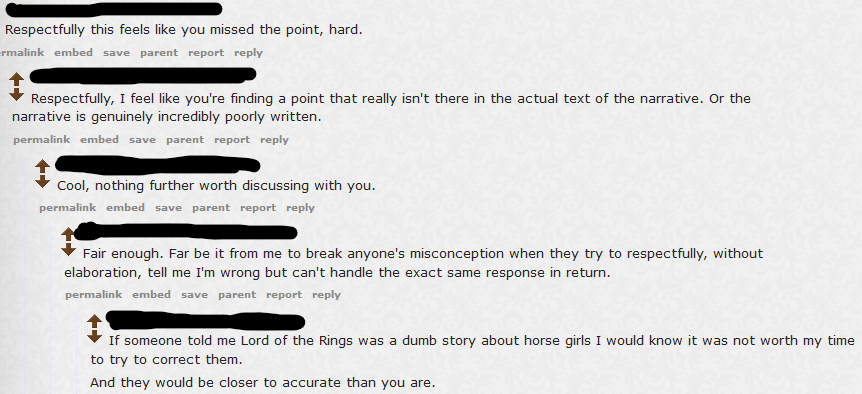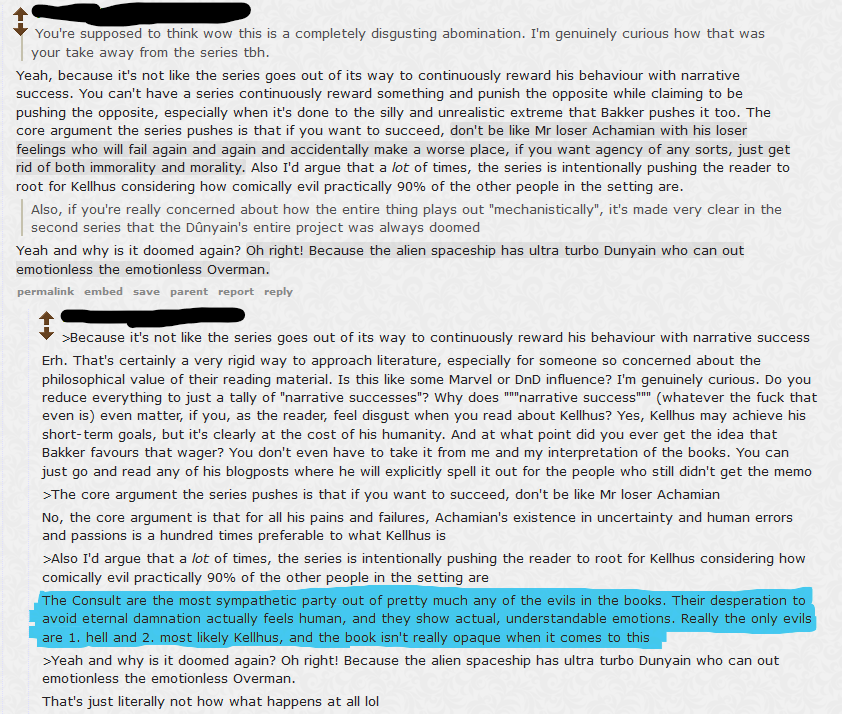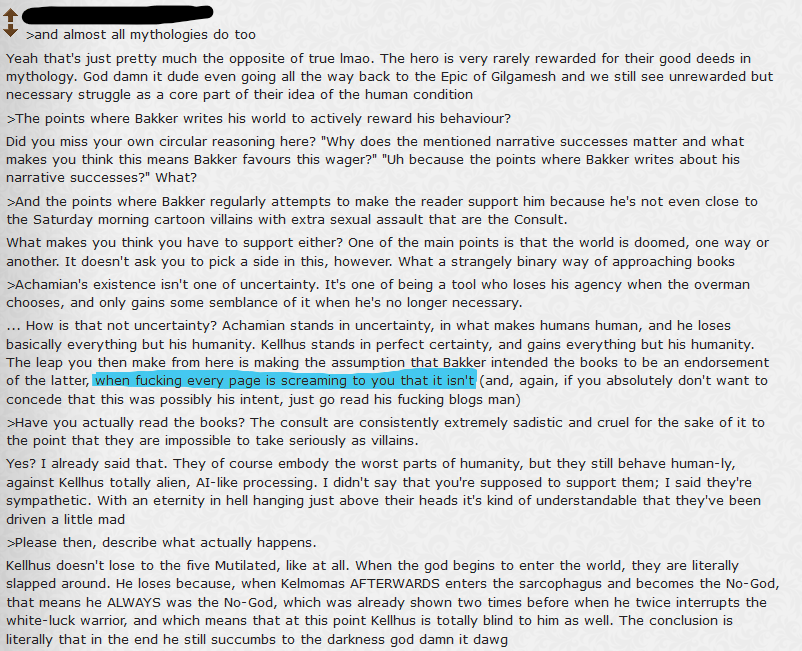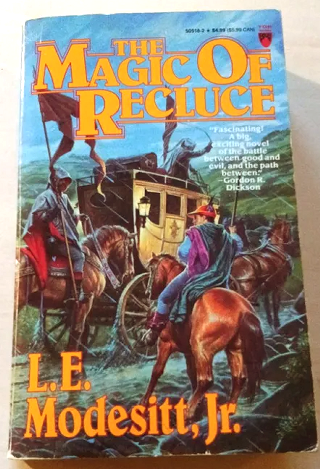This is just an unplanned extra, not very relevant.
Today I received a not especially important book order. I wouldn’t be writing about it. It contains the latter three books by Ruocchio, Kingdoms of Death, Ashes of Men, Disquiet Gods, just to have them all before the last one comes out in November (but I’ll then wait a year for that once, since I think I have some cheaper trade paperbacks, I think?), then The Will of the Many, by James Islington, and the last is Miss MacIntosh, My Darling by Marguerite Young, which is the “stick out like a sore thumb” in this group.
When I opened the package I realized that something didn’t look quite right. All the books are actually okay, only Miss MacIntosh is a bit battered, but nothing very serious. The first visible was Disquiet Gods… and it was much larger than expected.
I’m the one who gathers lots of information before picking up books, one of the factual elements is wordcount, and I always look at wordcount for long series. They tell a lot of the “shape” of the story. So when I pick up Disquiet Gods, I know already pretty much everything about this series, outside of details of the plot (tho I ended up picking a couple of bad spoilers). This book, the 6th, is indeed close to the largest, up to this point, at 282k, but not so comically large compared to the rest. The third is 285k. Yet this 6th is almost TWICE as thick!
The other two, 4th and 5th, were instead very thin, compared. This is in line with expectations, as they are shorter books, both at slightly less than 200k, and because they were originally one volume that was split because of shitty publisher impositions. These two books (4&5) exactly match the format of book 2 and 3 that I already have. They are the European/UK editions, with the much more uglier and anonymous covers, by Head of Zeus (not the illustrations, the paperback editions). In that weird paperback mid format that is quite larger than mass market, but smaller than the default hardcover/trade paperback. I get these merely because they cost much, MUCH less to the insanely overpriced US “cheap” paperbacks.
EDIT: I’ve now realized why the latter 3 Ruocchio’s books are much shittier in quality compared to the first 3, despite all of them being UK editions. The first three were published by Gollancz, the other three by Head of Zeus. While Islington’s book is not published by Head of Zeus, but Saga Press, it shares the same actual printer (and rather awful binding and stiff paper), so the bad actor is in common and is “CPI Group (UK) Ltd, Croydon, CRO 4YY”, whereas Gollancz printed through “Clays LTD, Elcograf S.p.A”. As we know, the bad ones always prevail.
Because, you know, DAW (the US publisher) got bought by some Chinese company, that then proceeded to cancel all mass market versions, gut all the warehouses so that no previous books could be purchased, and then proceeded to almost double the prices for everything produced from that point onward. Capitalism!
By the way, that’s the reason why I had to find the whole series by Michelle West exclusively as used copies. That was DAW too, all books were removed from the market.
Anyway, when I ordered book 3-6 by Ruocchio I was simply expecting of receiving the same edition. All these books were released in a very short time span, that’s one significant feature of this series: seven relatively big books for an ambitious space opera, but fully delivered in a very tight interval of time. Whatever you think about the writing, Ruocchio delivered a complete series without years of delays that typically happen.
So I expect a consistent edition. Whereas, book 4 & 5 indeed respect the format of the previous volumes, but holding them in my hands they don’t feel quite the same. In this case it’s the quality of paper, being more stiffer. The kind of paper that doesn’t really want to bend and prefers keeping its straight planar shape. I mean, it’s not a big deal, but suddenly book 4 & 5 have worse paper.
Then we come to Disquiet Gods. If possible, this one got even more stiffer paper, but it’s when you open it up that it’s ridiculous. All the previous paperbacks have a rather small font than usual, that I still quite enjoyed. I like it more when text on the page has space to breathe, rather than obsessively having eyes constantly move to a new line, and turning pages too quickly because text is very light on the page. So having small text usually meets my preference, and I was completely okay for the format used from book 1, all the way to book 5. And then of course book 6 changes everything. Why not? Book 6 is comically larger in size, because for some completely ABSURD reason they decided to enlarge the font. Not only, if the previous volumes had a page made by 39 lines, this much larger one has only 37 lines on a page.
I’m writing about these pointless details merely because of the LOGICAL ABSURDITY. I just got book 4-5, that in pure wordcount are the shortest books in the series. And they go with the “smaller than average” font. Then you get book 6, which is significantly LARGER in wordcount, and they go with the logically OPPOSITE solution of making the font MUCH LARGER on top of that. So that now you hold a brick of a book in your hand. You put them side by side, and you have the first 5 all relatively matching, then this ogre of a book as volume 6, when in wordcount is actually shorter than the third. It makes no sense, and it also makes one ugly book. If the first 5 have, maybe, slightly smaller than ideal font (but perfect for me), the 6 suddenly goes for bigger than ideal. Right to the other extreme.
Why? It’s all about that. Why? Why you print 5 books in a series with the exact format, then switch to its EXTREME OPPOSITE for the 6th?
Is there a human being, in there, who consciously made that choice? Why?
It’s not an important question. No one really cares. But it’s a question that cannot possibly have a logical answer. But that’s the reason I’m writing this, and why I’m not yet done here.
Let’s pick up The Will of the Many, shall we? This is an immensely popular book that I picked up mostly because of significant peer pressure, as tons of people were and are talking about it. Not so much unlike Ruocchio actually. In both cases there were also a few specific elements I was curious about. So without any rush they end up in a list, and now I ordered a copy since it was rather cheap.
This edition of the Islington book matches, physically, almost perfectly the editions of Ruocchio’s books. The same mid-sized paperback. This one published by Saga Press, with the stylized orange cover. I like the design a lot, really neat, quite elegant, good colors.
And then you open it. I think, for the very first time IN MY LIFE, I don’t think I can actually read this book. I think I’ll have to order a new copy, for fuck sake.
I always complain that the trend in recent years is making text on the page larger and larger. Most books now look like children books, for so comically large they are printed. And I’ve also said that this choice is for me not just aesthetically wrong, but it also affects my reading in practice, because my brain gets distracted by having too short lines constantly interrupting the flow, and turning pages in a way that actively disrupts the moment of the story. Too heavy pages are also equally problematic, because they take the oxygen out, you feel like not moving at all and this makes the read more tiring. But books aren’t new technology, and modernity is ALWAYS A LIE. Meaning that there are really no new solutions you have to find out, only lessons to unlearn, and the well known enshittification.
If I can’t find a logical motivation for the way Ruocchio’s 6th book suddenly disrupts its own format, then, even less, I can fathom how it’s possible to publish this The Will of the Many, with a well designed outside shape… and then you open the pages…
Now… I live in a rather alien dimension where up to this point I still never owned a smartphone. So I’m sorry, I don’t actually have means of taking and posting photos. It’s simply true. This is something that would need to be shown in images.
Description will have to do. Imagine footnotes to a text. Not just average footnotes, but the tiniest footnotes you’ve experienced. The kind of text you need to make effort to parse, to squint.
I did mention this isn’t just another book. It’s one of the most popular and most discussed out there. It’s a big, commercial deal. I’ve also said how the recent trend is to make the font constantly larger. Since it’s the commercial target and trend, whenever you match popularity with the epic genre, you have guaranteed that some 200k, 500-pages standard books get published at over 800 pages bloat-bricks. The trend is making everything much larger than it needs to be.
Imagine the tiniest footnotes, and that becoming the main text on the page for this edition. The absurdity doesn’t end. Imagine the white rectangle of the page, then imagine a much smaller rectangle within, and take all the text in this unreadably tiny footnote-sized font and CRAM IT DOWN to the second tiny rectangle. You obtain a page with MASSIVE EMPTY MARGINS that almost take half of the space on the page, and the actual text, in it’s unreadable miniaturistic font, pasted in the middle as if someone took a picture of the page and then shrunk it down and glued it to the page.
While I’m not a fast reader who read thousands of books in my life, I’ve held in my hands a rather huge number of them. This is I think the smallest text I’ve seen in a commercial book.
It makes NO SENSE. It’s UGLY AS SIN in its aesthetic form, because of so much empty space wasted, and because of way too small to be read in practice.
And the real question is, once again, HOW. Why?
How is this possible in practice? How is this the result of conscious choice? Not only it disrupts ALL marketing trends, but it produces something universally unreadable, for the edition that, being the cheapest, you expect being more widely read. Then, how could this come to be? I hold in my hands the equivalent of an impossible object. A metaphysical piece that is in contradiction with all the laws of reality. Impressive.
So we come to “Miss MacIntosh, My Darling”, this one being not quite a brick of a book as a gravestone, being larger in format. It’s a big, wider, blunt (and heavy!) rectangle. Feels quite cheap, actually. Like the “printed by Amazon” books, that have quite decent paper, but still feel like, I don’t know, just very plain. Turn the page, after an introduction, you get to Chapter 1 and page numbers starting from page 3, then you flip it to the end, go back to the actual last page written, and it’s page 1320. Nice. Then you can just open the book randomly, any page will do…
Because this is the literal wall of unbroken text. On every page. For 1300 of them. There is no spacing of any kind (there is occasionally one broken line). Believe me, it’s quite a visual experience.
Wordcount is 672k. Outside of Bottom’s Dream, which is its own class of alien object, this is the biggest single volume I own (and that I’ve seen). But it’s actually nice because it’s not a tiny font. Comfortably readable. Yes, you can print books that almost reach 700k. No you don’t need to split them. No you don’t need any special, extremely rare and expensive “printing technology” (I swear, this has been truly claimed by publishers as an excuse). No, in order to publish such books you don’t need to use unreadably tiny fonts. This one uses a font that is much larger than all the books I’ve just received. Islington’s book’s the REAL problem here, 650 pages leaving all wasted space at the margins to cram all text in the center while using footnote-sized font.
I ordered Miss MacIntosh, My Darling, despite being one interest and curiosity of mine but not exactly a current priority, merely out of frustration because Schattenfroh, while out already in the US, is unavailable in the EU. My preorder is morosely stuck sitting there.
Ruocchio can wait, I only wanted to have all the remaining volumes. Islington, I was curious to read at least a few pages, but I’ll have to order a different edition. I guess I’ll start with Miss MacIntosh, then. Main current read is “Sons of Darkness” by Gourav Mohanty, it was another leap of (not) faith, we’ll see. I already own the second volume. If I get to it, it’s possible I’ll write about it here with both volumes taken as one, because even if I’m just 100 pages into the first, it feels too fleeting even to form an opinion. Polar opposite of Hobb, where within 100 pages you already know perfectly what you’re reading.
(how did I get to write over 2k words on this?)
P.S.
Oh fuck, I forgot. I meant to write about another absurdity of the Islington book: the prologue is at the end.
No, not a printing error. There’s a short comment by the author as a partial explanation. It looks like the prologue was cut by the publisher “for pacing reasons” and then the author got to include it as an “APPENDIX A” (there’s no appendix B) because he thought it too important to be left out and “of everything we took out, it was by far the part I was the saddest to see go”. He mentions this cut was done “correctly” though this note is written in February 2024, so I deduce it was not part of the first edition. Being 10 pages long, no, I don’t think “pacing” can be a logic reason for the cut.
It’s just the usual publishing industry. Doing things that make no sense. Just because. Cutting 10 pages to then paste them at the end of a second edition, great choice. Yet couldn’t even do basic layout that could be read. We just don’t have the technology to print books anymore. Thumbs up.
I was saying, elsewhere, the KPOP DEMON HUNTER, “Golden” song. What does it tell us about “autism announcement”. You wonder: come on, how can these be possibly related, now?
They are because I’m asking myself questions. How is it possible that a fucking POP SONG has so much technical expertise and quality crammed into it. Experts who know what they are doing. Who worked all their life to study and perfect those skills. For a fucking pop song. And then we have selected the MOST INCOMPETENT AND DROOLING FUCKWITS for our actual governments. Who decide on the literal life of entire populations. How is this possible. The skill pumped into a pop song, and the incompetence pumped into the government. How is it possible. How can this make sense. How can this be anything other than just the laughter of a deranged god.

